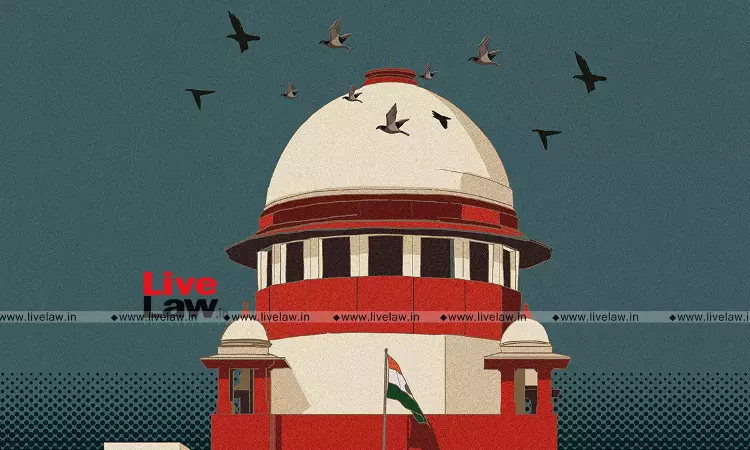- Home
- /
- Top Stories
- /
- Mere Performance Of Another...
Mere Performance Of Another Religious Ritual Doesn't Mean Giving Up Of One's Own Religion : Supreme Court
Gursimran Kaur Bakshi
6 May 2025 8:44 PM IST
The Supreme Court today(May 6) set aside the Kerala High Court's judgment which annulled the election of CPI(M) MLA A Raja in the 2021 Legislative Assembly elections.A bench comprising Justice AS Oka and Justice Ahsanuddin Amanullah allowed the appeal filed by Raja against the the March 23, 2023 order of the Kerala High Court which annulled his elections on ground that he was not a member of...
The Supreme Court today(May 6) set aside the Kerala High Court's judgment which annulled the election of CPI(M) MLA A Raja in the 2021 Legislative Assembly elections.
A bench comprising Justice AS Oka and Justice Ahsanuddin Amanullah allowed the appeal filed by Raja against the the March 23, 2023 order of the Kerala High Court which annulled his elections on ground that he was not a member of the 'Hindu Parayan' within the State of Kerala and therefore, he was not qualified to contest elections from Devikulam Assembly constituency that had been reserved for Scheduled Caste among Hindus.
The judgment authored by Justice Ahsanuddin Amanullah rejected the argument advanced by the Respondent that the Appellant was baptised and therefore, converted to Christianity. The Court found that, as per the evidence produced by the respondent himself, the age of the person who claimed to have baptised the appellant at the time of the alleged baptism was only 14 years. The Court therefore disbelieved the baptism claim as as "unbelievable and unsustainable". Also, the baptism register and entries were vague and not reliable. In any case, the Court clarified that mere performance of a ritual does not ipso facto mean that the person professes that religion.
"It is relevant to observe that mere observance/performance of a ritual of/associated with any religion does not ipso facto and necessarily mean that the person 'professes' that religion. That is why the term used in the 1950 Order is 'professes', signifying that a person although born in a particular religion can profess another religion, inter alia, by practicing the rituals of that other religion as the basic tenets of his beliefs and lifestyle. Adherence merely to some ritual of another religion would not tantamount to giving-up the original religion, unless the person concerned makes such belief explicit."
The Court had taken one central issue, which is whether the Appellant belongs to the Hindu Parayan caste in the State of Kerala and is covered by the Schedule to the Constitution (Scheduled Castes) Order, 1950 (1950 order) insofar as it relates to the State of Kerala.
The Court said that it required two conditions to be fulfilled: 1. being of the Hindu Parayan caste, and 2. being, himself or herself, or through one's ancestors, permanent resident fo Kerala as on the date of the 1950 Order.
Justice Amanullah first undertook the second condition and answered it affirmative that the grandparents of the Appellant belonged to the Hindu Parayan caste in the erstwhile State of Travancore-Cochin having migrated from the State of Tamil Nadu but prior to 1950.
On whether the Appellant belonged to Hindu Parayan caste, the Court perused the evidence and stated that is not in a position to hold that the Appellant professed Christianity.
"From the evidence available, it is not possible to hold that the Appellant 'professes' Christianity. In the factual setting of the present lis, the evidence adduced from the side of the Appellant would reveal that the Caste Certificate(s) issued in his favour by the Competent Authority till date hold the field. The Appellant's Caste Certificate has not been interfered with, either by the Impugned Judgment or by the authority(ies) concerned."
It should be noted that during the hearings, the Court had asked if Appellant's caste certificate was challenged before the High Court. On being informed that it was not, the bench questioned how could High Court annul the elections if the veracity of caste certificate was not considered.
It added that the production of some photographs or some rituals, which may have been performed by the Appellant, would in no way take place of the evidence which is the existing caste certificate.
"Back to the facts, the records from the school where the Appellant's children study show them as members of the Hindu Parayan caste. In the present time, which is a day and age of intrusive media, including social media, where public figures, including Judges, politicians and bureaucrats are under constant public gaze, it is not easy to hide one's religion or caste. The production of some photographs or some rituals which may have been performed by the Appellant, nay, even assuming they were actually performed by the Appellant, at the cost of repetition, can, in no manner, take the place of evidence, especially when matters of the like herein are being considered by the Courts."
Lastly, the Court also found that the Competent Authority, which issued the caste community certificate, was not examined in the election petition. For all these reasons, the appeal was allowed.
Case details: A. RAJA v. D. KUMAR| C.A. No. 2758/2023
Citation : 2025 LiveLaw (SC) 537
Appearances: Senior Advocate V. Giri (A Raja) and Senior Advocate Narender Hooda (D. Kumar)



